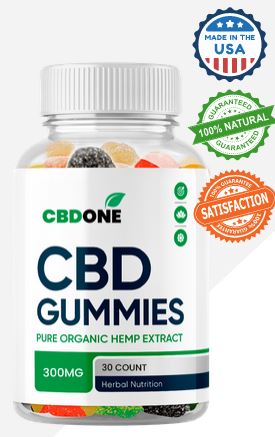You’ve turned off the lights, settled into bed, but as the clock ticks past midnight, you’re still wide awake, replaying the day’s events and fretting about tomorrow’s to-do list. It’s a scenario you know all too well, isn’t it? Enter CBD One-a solution that might just shift the tide in your favor. While you’ve likely heard the buzz around CBD products, you might be skeptical of their efficacy or curious about how they work. CBD One promises not only to help you catch those elusive Z’s but also to manage the stress that’s been dogging your days. But what’s the science behind it, and how can it fit into your lifestyle? Stick around, and you’ll uncover how this natural compound could potentially transform your sleep-wake cycle and bring a sense of calm to your daily grind.
Key Takeaways
- CBD One hemp extract offers calming effects that may improve sleep and reduce anxiety.
- Consult a healthcare provider before incorporating CBD One into your routine, especially if you are on medications.
- CBD does not cause a ‘high’ and may help increase sleep duration and aid in falling asleep.
- Transparency with healthcare providers and monitoring of CBD-prescription interactions are crucial when using CBD for sleep and stress.
The Science Behind CBD
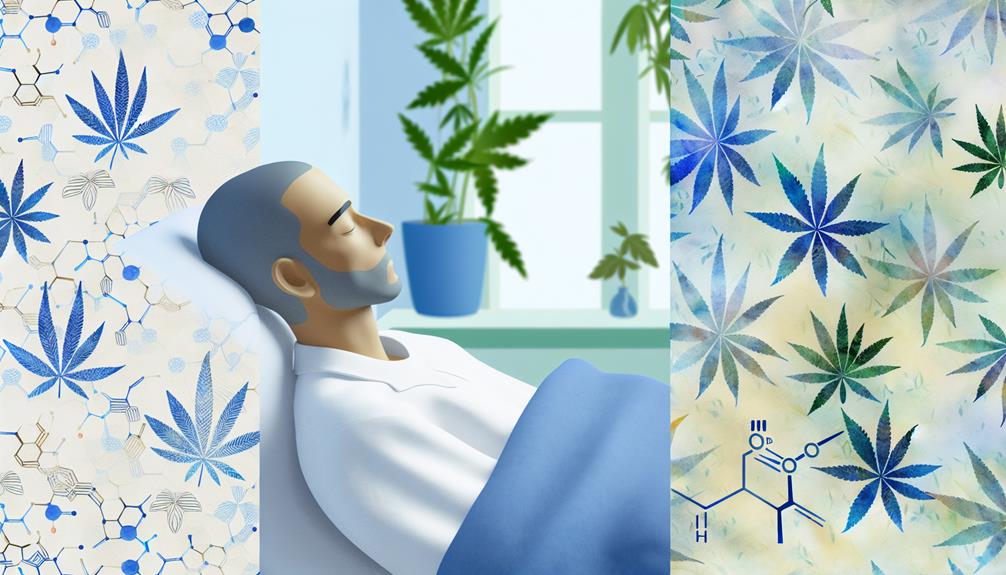
Delving into the science of CBD, it’s clear that its potential to soothe the nervous system and improve sleep stems from its interaction with the body’s endocannabinoid system. This complex network of receptors and neurotransmitters is responsible for maintaining balance across various bodily functions, including sleep, mood, and stress levels. CBD, which is derived from the cannabis plant, doesn’t have the psychoactive properties of THC, meaning you won’t experience any high, but it can still significantly influence your well-being.
CBD One hemp extract is a popular choice for those seeking the calming effects of CBD. Unlike cbd one gummies, which are a tastier and more convenient option, the hemp extract is often purer and more potent. The CBD one benefits are numerous, ranging from potentially improved sleep patterns to reduced anxiety, which could, in turn, promote emotional stability and overall health.
When considering incorporating CBD One into your routine, you should be mindful of the CBD One cost and CBD One price, as prices can vary based on concentration and quality. Investing in a CBD One pure organic hemp extract may ensure you’re receiving a high-quality product free from unnecessary additives.
It’s important to remember that while CBD shows promise, its effects on sleep disorders and anxiety are not fully understood and can differ from person to person. It’s also crucial to note that CBD may interact with other medications you’re taking, potentially causing side effects. Therefore, it’s always advisable to consult with a healthcare provider before starting any new supplement, especially if you’re considering using CBD to manage specific health conditions.
Understanding Cannabinoids
To fully appreciate the benefits of CBD One, it’s essential to understand cannabinoids, the active compounds in cannabis that interact with your body’s endocannabinoid system. This intricate network plays a pivotal role in maintaining your body’s balance, affecting everything from sleep to stress, and immune response to pain perception.
Here’s a quick rundown to bring you up to speed:
- Cannabinoids 101: There are over a hundred cannabinoids, but the most well-known are THC and CBD. THC is responsible for cannabis’s psychoactive effects, while CBD is non-intoxicating and is touted for its potential therapeutic benefits.
- CBD vs. THC: While THC can make you feel “high,” CBD does not have this effect. In fact, it’s sought after for its ability to help ease various conditions without the psychoactive buzz, making products like CBD One appealing for their calming properties.
- Legal Status: You’re likely wondering about legality. In the U.S., as long as the CBD is extracted from hemp plants containing less than 0.3% THC, it’s federally legal. This means you can use products like CBD One without worrying about legal ramifications.
- Safety First: Don’t rush off to try CBD One without doing your due diligence. If you’re on medication or have underlying health issues, it’s crucial to chat with your healthcare provider to ensure it’s safe for you.
FDA Status of CBD
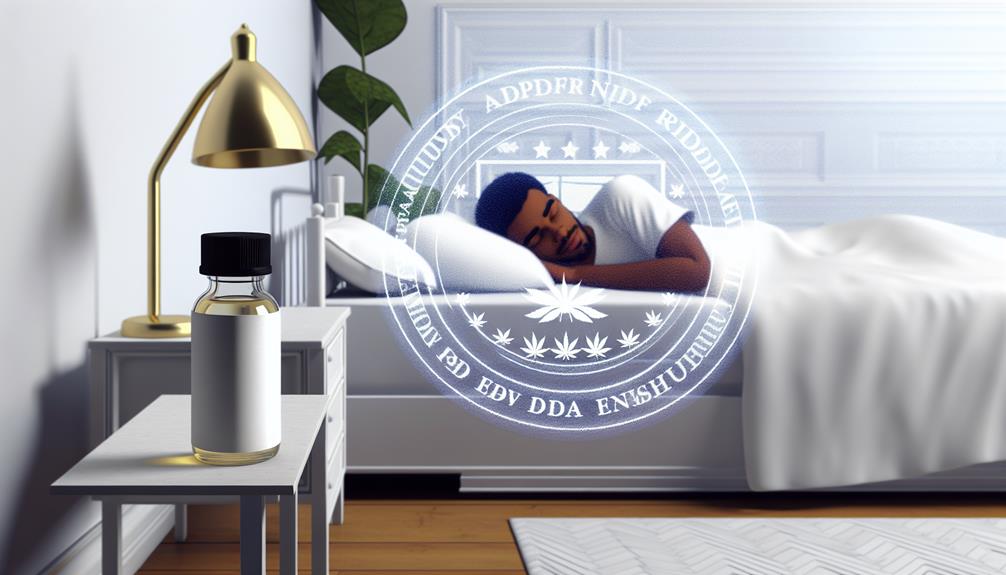
Understanding the FDA’s stance on CBD is crucial if you’re considering its use for better sleep and stress management. The FDA has been cautious about CBD, mainly because it wants to ensure safety and efficacy for consumers like you. As of now, only one prescription CBD product, Epidiolex, is approved by the FDA to treat certain forms of epilepsy.
Despite this, many hemp-derived CBD products are available on the market. They’re legal as long as they contain less than 0.3% THC. But here’s the kicker: most of these products are not FDA approved. This means they haven’t undergone the rigorous testing that medications typically go through to ensure their safety, quality, and effectiveness.
Here’s a quick snapshot to help you understand the FDA’s current position on CBD:
| FDA Approval Status | Implications for You |
|---|---|
| Only one approved CBD drug (Epidiolex) | Limited FDA-validated options for treatment |
| Unapproved CBD products widely available | Buyer beware – research products and brands |
| CBD is not allowed in food, dietary supplements | You’ll find CBD in oils, topicals, but not edibles |
| Ongoing research into CBD’s effects | Future developments could change the landscape |
It’s important to stay informed and cautious. If you’re eyeing CBD to help with sleep or stress, speak to your healthcare provider. They can provide guidance tailored to your health needs. And remember, the FDA’s views and regulations may evolve as more research comes in, so keep an eye out for updates that could impact your choice to use CBD products.
Forms and Doses of CBD
When considering CBD for better sleep and stress relief, it’s essential to explore the various forms it comes in, such as oils, capsules, and edibles, as well as the range of doses that might work for you. Each form offers its own advantages, and the correct dose can greatly influence the effectiveness of CBD in managing your sleep and stress levels.
Here’s a breakdown to help you understand your options:
- Oils and Tinctures: These are typically administered using a dropper, allowing for flexible dosing. Sublingual application (under the tongue) means they can take effect relatively quickly.
- Capsules and Pills: For those who prefer a no-fuss approach, capsules provide a precise dose without the need for measuring. They’re discreet and have a delayed onset due to the digestive process.
- Edibles: Gummies and other CBD-infused treats are not only enjoyable but also easy to dose. However, like capsules, they may take longer to kick in due to digestion.
- Topicals: While more commonly used for localized relief, creams and balms can be part of a relaxing bedtime routine.
The doses of CBD can vary widely, from as little as 25 mg to as much as 600 mg per day. It’s important to start with a lower dose and gradually increase it if necessary, monitoring how your body responds. Remember, more isn’t always better, and it’s crucial to consult with a healthcare provider before adding CBD to your regimen, especially if you’re currently on medication or have underlying health issues.
Effects and Health Conditions
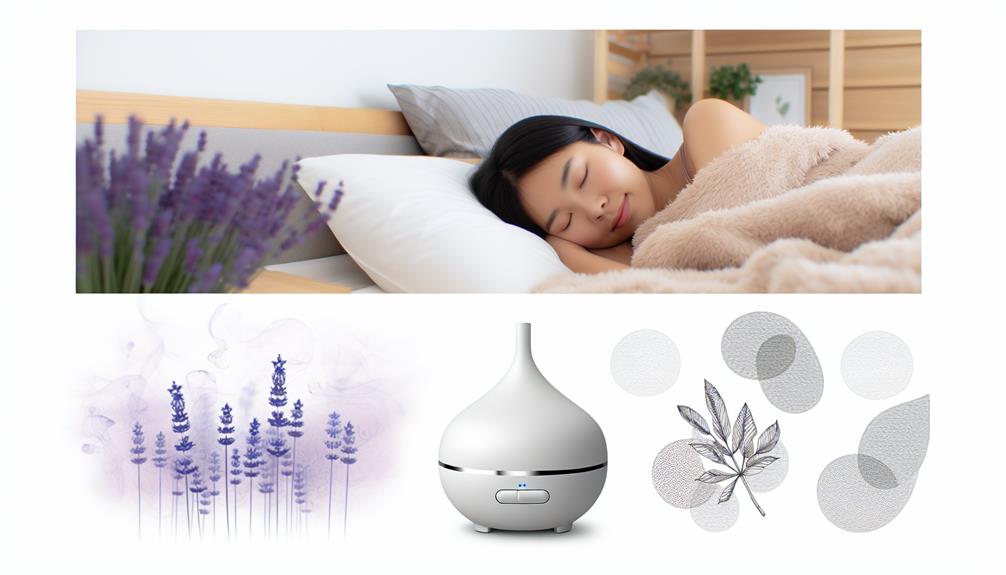
Having explored the forms and doses of CBD, let’s now examine how its calming effects can influence certain health conditions, particularly those related to sleep and stress. CBD’s interaction with your nervous system, notably its ability to alter mood through the serotonin system, is at the heart of its potential benefits. You won’t experience a ‘high’ as CBD doesn’t have the psychoactive properties of THC, and it may even reduce THC’s effects if they’re used together.
When it comes to sleep, you’re likely seeking ways to get more shut-eye. Preliminary research suggests CBD might help increase sleep duration and make it easier for you to fall asleep. This could be a game-changer if you’re battling with insomnia or other sleep disorders. However, it’s essential to remember that while CBD is generally well-tolerated, it’s not without possible side effects, such as drowsiness or diarrhea in some cases.
If you’re considering CBD for stress relief, its potential to promote a sense of calm is particularly relevant. By mitigating feelings of anxiety, CBD may help you manage daily stressors more effectively, leading to improved mental well-being and emotional stability. This could enhance your overall quality of life and health.
Before you jump on the CBD bandwagon, it’s crucial to talk with your doctor, especially if you have medical conditions or take other medications. CBD could interact with these medications, leading to unwanted side effects. While CBD is promising, ongoing research is vital to fully understand its long-term risks and interactions. So, stay informed and cautious as you explore whether CBD is right for you.
CBD and Sleep Disorders
If you’re tossing and turning at night, CBD’s potential role in alleviating sleep disorders may offer some hope for better slumber. With an increasing interest in this natural remedy, you might be curious about how CBD One could fit into your nighttime routine. Let’s break down what current research suggests about CBD and sleep:
- Varied Effects: Not everyone will experience the same benefits from CBD when it comes to sleep. While some individuals report improved sleep quality, others may not notice significant changes. It’s important to remember that CBD’s influence on sleep can be quite personal.
- Multiple Forms: Whether you prefer oils, pills, or edibles, there are various ways to incorporate CBD into your sleep regimen. Each form has its own onset time and duration of effect, so you might need to experiment to find what works best for you.
- Consult a Doctor: Before you start using CBD for sleep, especially if you’re dealing with a diagnosed sleep disorder, talk to your healthcare provider. It’s crucial to ensure it won’t interfere with any existing treatments or medications you’re taking.
- Ongoing Research: Although some studies indicate that CBD may help increase sleep duration and make it easier to fall asleep, the long-term effects are not yet fully understood. Continuous research is essential to fully grasp how CBD might aid those with sleep disorders.
CBD Interactions With Prescriptions
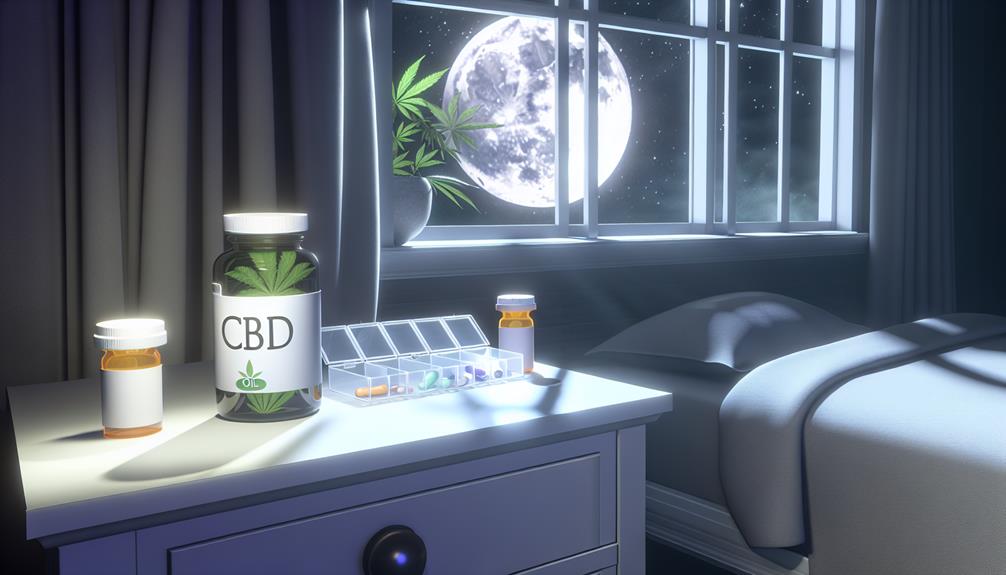
Before adding CBD to your health regimen, it’s crucial to discuss any potential interactions with your current prescriptions with your doctor. You see, while CBD has been gaining attention for its potential to enhance sleep and reduce stress, it’s not without its complexities. Your body processes various substances, including CBD and other medications, through a group of enzymes known as the cytochrome P450 system. Here’s where it gets tricky: CBD can inhibit these enzymes, potentially altering the way your body metabolizes certain drugs.
If you’re taking medications with a narrow therapeutic index, meaning the range between a drug’s effective dose and a harmful dose is quite small, this is particularly concerning. Even common prescriptions, such as blood thinners, antidepressants, and some over-the-counter drugs, can be affected. For instance, if CBD increases the concentration of a medication beyond its therapeutic threshold, you could experience exacerbated side effects or toxicity.
Therefore, it’s essential to be transparent with your healthcare provider about all the medications, herbs, or supplements you’re taking. This openness allows your doctor to make an informed decision about whether CBD is a safe addition to your regimen and what adjustments may be necessary to avoid adverse effects.
Research is still ongoing to fully understand the breadth of CBD’s interactions with prescriptions. As science progresses, more precise guidelines will emerge. But for now, your best bet is to stay informed, stay in touch with your doctor, and approach the integration of CBD into your life with caution and care.
Expert Insights and References
To fully grasp CBD One’s role in enhancing sleep and mitigating stress, it’s crucial to delve into expert insights and references that shed light on its scientific interactions and potential benefits. You’ll find that the body of research on CBD is growing, with studies examining its effects on the endocannabinoid system, which plays a key role in maintaining bodily homeostasis, including sleep regulation and stress response.
Here are some key points that experts highlight:
- Endocannabinoid System Interaction: CBD interacts with your body’s endocannabinoid system, which may help regulate your sleep-wake cycle and improve sleep quality.
- Anxiety and Stress Reduction: Several studies suggest that CBD can lower anxiety levels, which often contributes to sleep disturbances, thus aiding in better sleep.
- Safety and Side Effects: While CBD is generally considered safe, it’s important to be aware of possible side effects and interactions with other medications you might be taking.
- Consultation with Healthcare Providers: Always talk to your doctor before starting any new supplement, including CBD, to ensure it’s appropriate for your specific health needs.
The insights and references you’ll encounter typically present a balanced view of CBD’s efficacy, emphasizing both the positive findings and the need for further research. It’s also worth noting that while some studies show promising results, the FDA has not approved CBD for the treatment of sleep disorders. This means that while you might find anecdotal evidence and preliminary research supportive of CBD’s sleep-inducing and stress-reducing effects, you should approach these claims with an informed and cautious mindset.
CBD and Sleep Resources
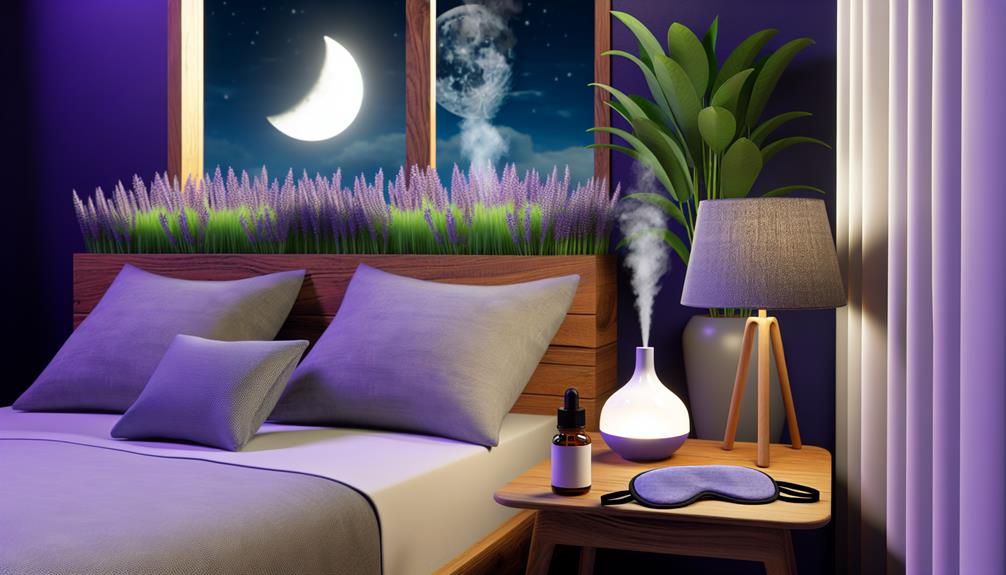
Exploring various CBD resources can illuminate how this compound may facilitate better sleep by easing pain and anxiety symptoms. You’ve likely heard about CBD’s calming effects, but how does it really play into getting a good night’s rest? Let’s dive into what resources are available to you.
Firstly, it’s crucial to understand that while research is promising, CBD’s effectiveness for sleep can vary. As you consider CBD as a sleep aid, keep in mind that it’s not a one-size-fits-all solution. It’s recommended to consult with a healthcare provider, particularly if you’re already on medication or have existing health issues.
To help you navigate the world of CBD and sleep, check out the table below for a quick guide on resources you might find useful:
| Type of Resource | Description | Where to Find |
|---|---|---|
| Research Studies | Peer-reviewed papers on CBD’s effects on sleep. | Medical journals, PubMed |
| Online Forums | Discussions and personal experiences with CBD for sleep. | Reddit, CBD forums |
| Product Reviews | Consumer feedback on different CBD products for sleep. | E-commerce platforms, independent review sites |
| Professional Consultations | Expert advice tailored to your needs. | Healthcare providers, specialized CBD clinics |
Each type of resource offers unique insights. Research studies give you the scientific backing, online forums provide community experiences, product reviews highlight user satisfaction, and professional consultations ensure personalized guidance.
When assessing these resources, it’s important to evaluate the credibility and relevance to your particular situation. Not all information is created equal, so focus on authoritative sources and verified experiences. Remember, clarity and precision are key as you explore how CBD One might help you sleep more soundly and stress less.
Frequently Asked Questions
What Is the Best CBD for Stress and Sleep?
If you’re fishing for relief in the sea of stress and sleepless nights, casting a line for a high-quality CBD might reel in some peace. Look for products with positive reviews and third-party testing to ensure purity and potency. Remember, it’s not one-size-fits-all, so you may need to experiment to find your perfect match. Always check with your doctor, especially if you’re already dropping other meds into your daily pond.
Does CBD Make You Sleepy or Just Relaxed?
CBD’s effect on you can vary; it might make you sleepy or simply relaxed. It doesn’t necessarily cause drowsiness, but it can help ease your mind and reduce anxiety, which might lead to better sleep. If you’re looking for a direct sedative effect, high doses may promote sleepiness. Always check with your doctor before starting CBD, as it can interact with other medications. Remember, individual experiences with CBD can differ.
Is It Okay to Take CBD Every Night?
Taking CBD every night could be beneficial for your sleep and stress levels. Research suggests it may increase sleep duration and help you relax. However, it’s important to consult with your doctor first, especially if you’re on other meds. While some studies indicate potential for reduced anxiety and better sleep, remember that everyone’s body reacts differently. Start with a low dose and monitor your body’s response to ensure it’s the right choice for you.
What Is the Best Sleep Aid for Adults With Anxiety?
If you’re an adult grappling with anxiety and seeking a sleep aid, it’s critical to consult with your doctor for a tailored recommendation. They might suggest cognitive-behavioral therapy, relaxation techniques, or possibly prescribe medications. Over-the-counter options like melatonin or valerian root are also popular. Remember, what’s best varies from person to person, so professional guidance is key to finding the right fit for your individual needs and ensuring safety.


